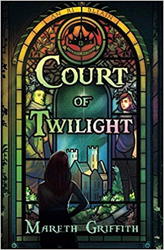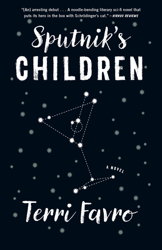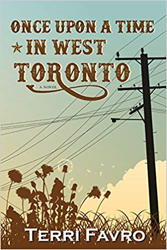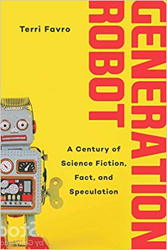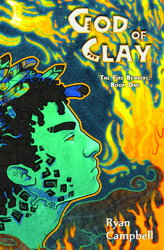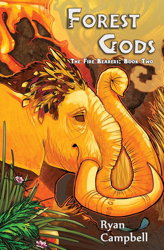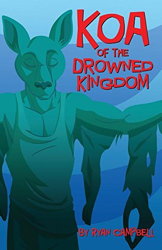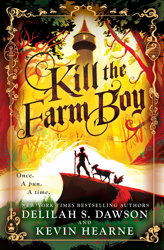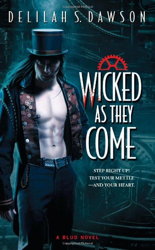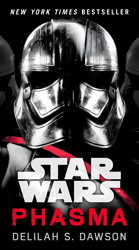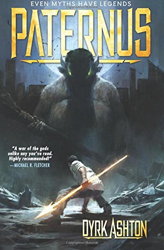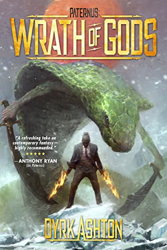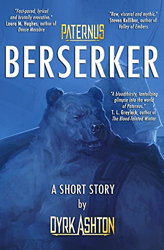
I believe I have finally, finally, recovered from the exhaustion produced by the recent Worldcon. Or at least I’ve stopped using that as an excuse and gone back to working on the next writing project. Exhaustion aside, I’m still floating on air from the incredible reaction I received from fans over The Moons of Barsk. And it certainly didn’t hurt that two of the three dealers carrying the book at the convention had completely sold out by the time I made the rounds to sign their stock.
But enough about the Worldcon. To introduce this week’a EATING AUTHORS guest I need to harken back to a previous convention. I first met Mareth Griffith back in May during the Nebula conference when I was hanging out with some folks from Parvus Press. She’d traveled a long way to be there. Mareth lives in Seward, Alaska where she works as a naturalist and wilderness guide. Apparently this involves leading the unwary (she calls them “adventurous souls”) on epic quests involving glaciers, bears, and whales. She assures me she comes by this lifestyle naturally, having lived and worked in Scotland, New Zealand, and Northern Ireland – where she claims her nearest neighbors included two thousand puffins and the ghost of a spectral black horse. Sounds like a writer to me.
Her first novel is Court of Twilight, and it surely won’t be her last,

LMS: Welcome, Mareth. Speak to me of your most memorable meal.
MG: For the last four years, I’ve spent most summers sailing around Southeast Alaska, working as a wilderness guide aboard a tiny cruise ship. Being a naturalist with an interest in wild edibles, I spent a lot of time trying to convince passengers to eat things I find growing in the woods.
On one particular trip, a tour company from Japan had chartered the entire boat for a weeklong trip, and brought along several of their own translators. And lots of their own food – suitcases and suitcases full of food the guides had shipped over with their baggage, or specially ordered from vendors in Juneau, or had air-mailed up from Seattle. Sashimi, wasabi paste, soba noodles… It was apparently part of the charter arrangements that the tour group emphatically did not want to chance American cooking. That was, apparently, one part of the cultural experience these travelers were not interested in experiencing. So, our chef gave up his usual array of king crab and sockeye salmon for a lot of stir fried vegetables, sticky rice, and miso soup.
On the last day of the trip, the Japanese tourists and I were spending a full day kayaking around a cluster of islands north of Sitka Sound. For our lunch stop, I decided to head to a particular beach on one of the largest islands of the archipelago. Paddling through a narrow channel, the passage opens up into a small lagoon, where the remains of an old dock sit, crumbling, along the edges of a vast expanse of green. The meadow is carpeted with one of my favorite wild edible plants. Salicornia pacifica, also known as glasswort, or beach asparagus.
Even for someone who loves foraged foods, I will be the first to confess that eating certain wild greens can be about as exciting as the prospect of eating badly cooked kale. Some greens can be bitter and stringy if they’re too old, or watery and bland if picked too young. Not so with beach asparagus. The plant has a thick stalk, as slender as a soda straw, with a crunch to it like a potato chip. Growing as they do on the edges of the tide line, they’re often pre-salted like a potato chip as well. Although stir-frying them cuts down on the crunchiness, I like them best when eaten raw, with that pleasant snap and salty aftertaste intact.
On this particular beach, the asparagus grows like a carpet, covering perhaps an acre altogether. Walking through it reminds me of the scene in Charlie and the Chocolate Factory where the kids are wandering through the park, eating everything they see.
As we sat down on the remnants of the dock, and began to unwrap our lunches, I pointed out the beach asparagus, and encouraged my guests to try some. Their eyebrows went up in surprise. A few of them broke off some stalks. One lady tentatively popped one into her mouth. The eyebrows went up some more. Several more of the group broke off stalks, amidst animated discussion in Japanese.
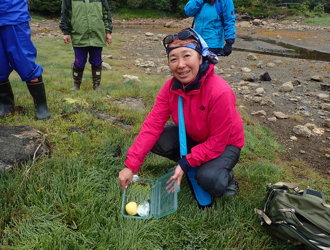
Then, I partially unwrapped my veggie wrap and added a handful of the raw stalks. I usually do this when I’m eating lunch in the field (have I mentioned the crew food on this particular boat wasn’t the most appetizing?) but I have never had a group adopt the practice as enthusiastically or completely as this group of Japanese kayakers. Eyes lit up. Mouths opened in surprise. Immediately, everyone on the beach started disemboweling their own wraps, salads, and rice concoctions, breaking off handfuls of the beach asparagus to add to their dish.
After a moment, one of the ladies, eyeing the line of shrubbery beyond the beach, asked, through their translator, was there anything else growing here they could eat?
Oh yes!
Leaving our kayaks by the old dock, we prowled the edges of the meadow, coming up with smaller quantities of goose-tongue (salty but bitter, with a crunch almost as good as the beach asparagus), beach green (lettuce-like and mild), and venturing a short way into the forest for the cucumber-like flavors of the leaves of the twisted stalk, topping off the resultant salad with a handful of wild blueberries and crowberries.
I couldn’t understand very much of what my guests were saying amongst themselves (I was staying quite busy making sure that the plants being harvested were, in fact, edible ones) but their expressions told me all I needed to know. Even when someone didn’t like a particular plant, they only seemed even more enthusiastic about getting everyone else to taste it, too.
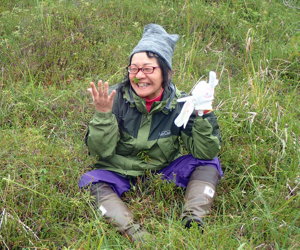
Eventually, we wandered back to the beach, finished our substantially-altered lunches, and took a short walk into a muskeg – a moss-covered wetland also known as a peat bog. Here, I showed the group the amazingly spicy scent that comes from lightly crumpling the leaves of the Labrador tea. The whole group collapsed into the muskeg, tired from paddling, full with lunch, pillowed on the spongey ground of the muskeg, many with tiny sprigs of crumpled tea leaves sticking out of their nose.
On our way back to the kayaks, both translators continued to forage, filling up one of the now-empty plastic lunch boxes with more impromptu salad. And when we returned to the ship for our last dinner of the trip, the resultant concoction was (in complete disregard of FDA regulations) spread out on the buffet, given a place of pride alongside the bean paste snacks and sashimi rolls. Though the Japanese tourists never did seem to warm up to the idea of caribou sausage or halibut cheeks, the wild greens turned out to be an unexpected window into appreciating Alaskan food.

Thanks, Mareth. Two things stand out for me from this. First, you should definitely go along on any “first contact” mission with aliens. Second, if something like this ever happens again, please send me the unwanted sockeye salmon; I promise to give it a good home.
Next Monday: Another author and another meal!
Want to never miss an installment of EATING AUTHORS?
Click this link and sign up for a weekly email to bring you here as soon as they post.
#SFWApro
